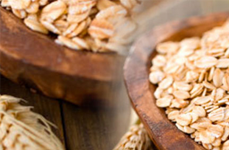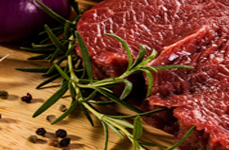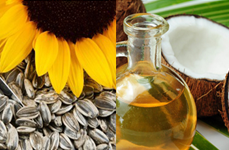Many trendy diets today rely heavily on lean proteins and monounsaturated fats to fill your plate, but if you ask us, nobody puts healthy carbohydrates in a corner. Whole grains are an essential part of a well-balanced, nutrient-rich diet for a handful of reasons, and there are so many delicious options to choose from. No matter the meal of the day, whole grains are here to take your nutrition game to the next level. Here’s everything you need to know about whole grains and how they can benefit your health.
What are Whole Grains?
Whole grains are the intact seeds of grass-like plants known as cereals (think corn, rice and wheat), as well as non-grass plants known as pseudo-cereals (like buckwheat, quinoa and amaranth). The one thing they all share in common is the whole-grain kernel. It’s composed of an outer shell called bran, a middle layer called the endosperm and an inner layer called the germ. Bran is full of fiber, minerals and antioxidants, the endosperm is predominately carbohydrates, and the germ contains vitamins, minerals, protein and nutritious plant compounds.
Since each part of the grain kernel offers unique health benefits, it’s important to consume all of them rather than remove part of the kernel, which is what happens in the production of refined grains. Refined grains typically only include the endosperm component of the kernel. Whole grains, on the other hand, can be rolled, crushed or cracked while still being considered whole grains because each part of the grain kernel is present in its original proportions.
The List of Whole Grains Includes:
• Amaranth: A traditional grain of Mexico.
• Barley: One of the world's oldest grains
• Buckwheat: A versatile staple of Eastern European cuisine
• Bulgur: Low-fat source of dietary fiber and protein
• Corn: 7 grams of dietary fiber per serving!
• Einkorn wheat: Man's first wheat—the oldest wheat known to scientists
• Farro: Traditional grain of the Mediterranean
• Fonio: Cultivated grass grain grown in Africa
• Freekeh: Traditional grain of the middle East
• Kamut: Traditional grain of Egypt
• Millet: Traditional grain of Asia
• Oats: A breakfast staple across the nation with 7 grams of protein and 5 grams of fiber per serving
• Quinoa: Technically a seed but with grain-like properties and nutrients—quinoa is considered pseudo-cereal grain
• Rye: A close relative of barley and wheat
• Sorghum: Traditional grain of India
• Spelt: Traditional grain of Germany
• Teff: A favored grain of Highland Ethiopians
• Triticale: A hybrid of wheat and rye
• Wheat: A worldwide staple grain
• Wild Rice & Brown Rice: These are considered whole grains, but white rice is not because it has the bran and germ removed
• Whole Grains Wellness Benefits
Now that you know which grains to reach for and why they’re considered whole grains, let’s review the health benefits they can bring to your life.
#1 Whole Grains Can Aid Digestion
Whole grains are full of soluble and insoluble fiber, both of which provide unique and important digestive benefits.
Soluble fiber is the kind of fiber that your body can digest. Soluble fiber is linked to healthy cholesterol levels, healthy blood sugar levels, healthy fat metabolism and cardiovascular health.
Meanwhile, insoluble fiber acts as a bulking agent in your gastrointestinal tract, helping to regulate bowel movements and promote regularity. Insoluble fiber is a vital component of how your body eliminates waste and is a necessity in your daily diet.
Also, certain types of fiber serve as prebiotics—food for the good bacteria in your gut—which help maintain a healthy and balanced microbiome.
The FDA recently made some changes to what can be classified as fiber on a nutrition label and increased the recommended daily intake of fiber from 25 grams to 28 grams per day.
#2 Whole Grains Can Help Fulfill Nutritional Needs
Fiber aside, whole grains are packed with a wide variety of nutrients that your body needs to function optimally. Whole grains are particularly full of B vitamins, especially niacin, thiamine and folate. They also contain a healthy dose of minerals, including zinc, iron, magnesium and manganese. Whole grains are also an excellent source of plant-based protein, which can come in handy for people who tend to avoid animal-based foods. Finally, they contain a collection of plant compounds called polyphenols, stanols and sterols that help to keep your body healthy as you age.
#3 Whole Grains Can Protect Your Heart Health
One of the biggest benefits of whole grains is their ability to support your cardiovascular health. Study after study suggests that eating several servings of whole grains each day has a direct impact on protecting the heart and arteries. The amount of fiber, vitamin K and antioxidants naturally present in whole grains also play a key role in maintaining cardiovascular wellness. Just remember that these benefits are specific to whole grains—refined grains don’t offer the same cardioprotective effects.
#4 Whole Grains Can Help You Manage Your Weight
The high fiber content of whole grains can also help to satiate your appetite because they take longer for your body to digest, leaving you feeling fuller than you would with low-fiber, quickly-digesting foods. This simple act of regulation can help you better manage cravings for extra snacks or less nutritious foods while helping you maintain a healthy weight in the process. And by maintaining a healthy weight, you can keep your blood sugar levels within a healthy range, maintain optimal insulin sensitivity and help protect your heart health.























LEAVE A COMMENT :
Comments sort : Newest / Oldest / Most Upvoted